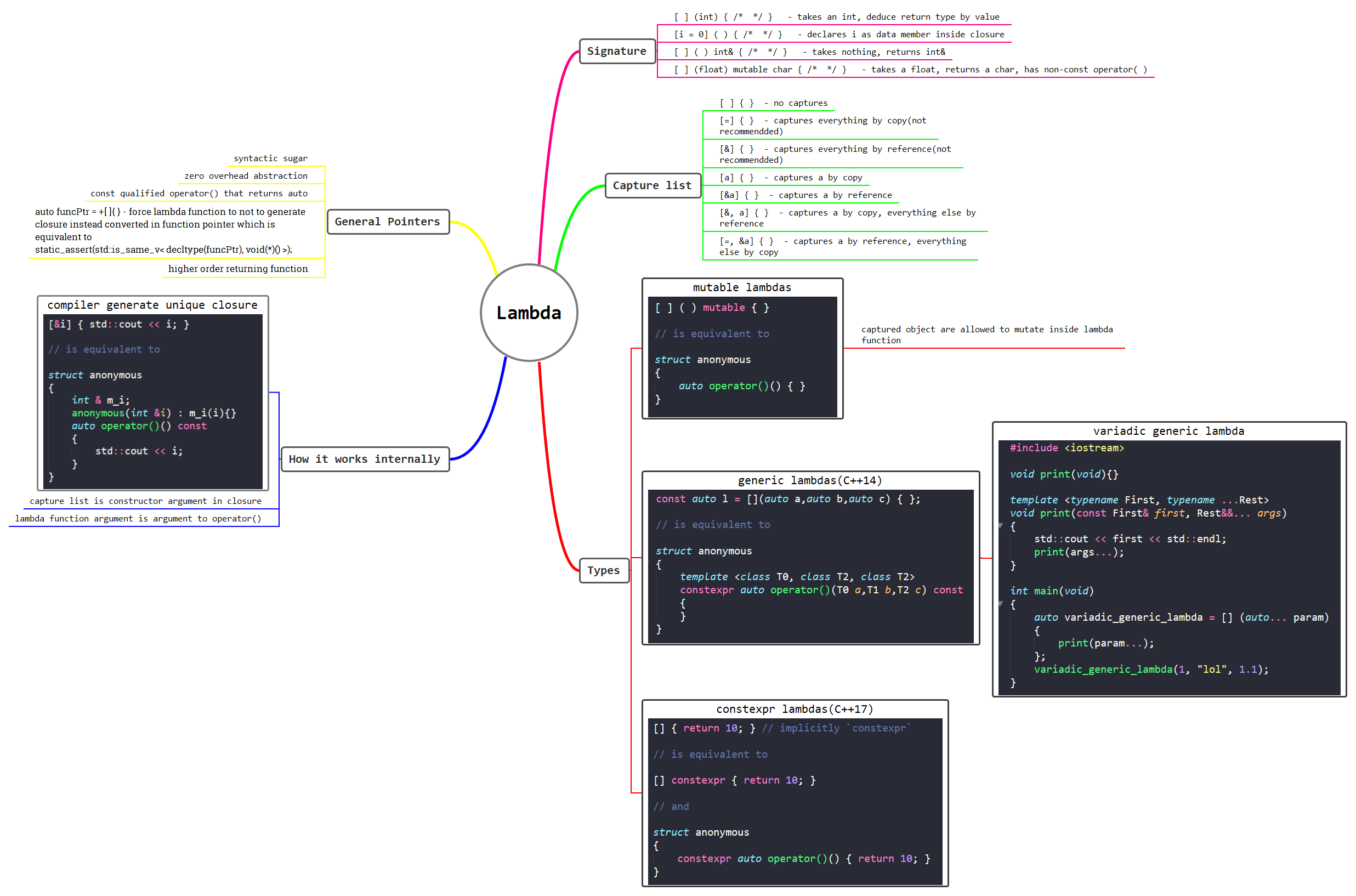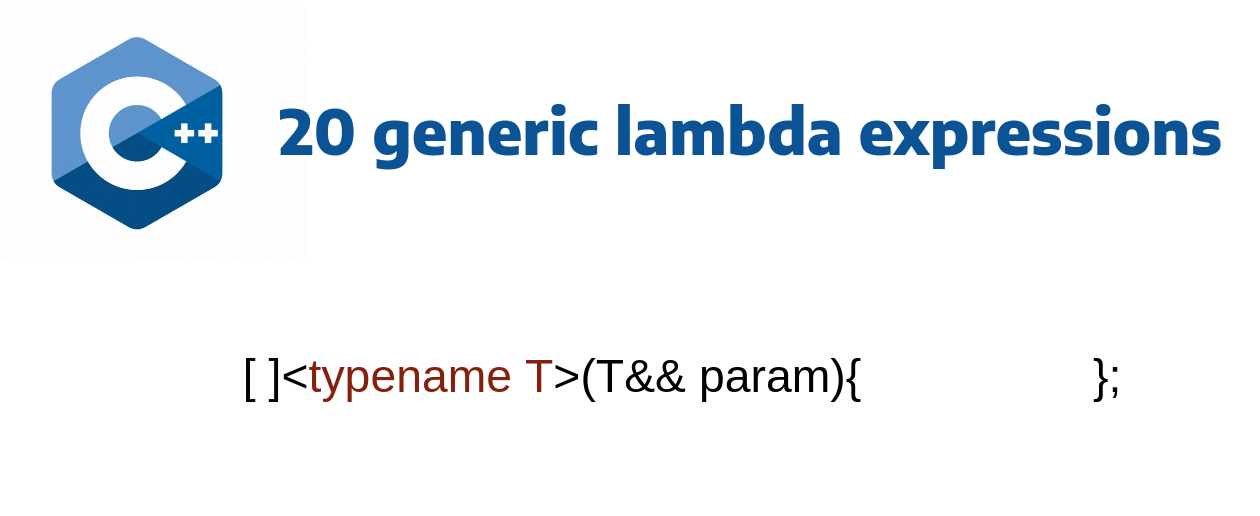C++ Template Lambda - Auto lambdatemplate = [&] (const int v) { return foo<t1, t2> (v); Web c++14 introduced the generic lambda expression into the core language feature which allowed the lambda expression to accept any parameter in its parameter list. Note that lambdatemplate is not a dependent name, and you shall thus not use the template. Web if you need to explicitly specify the template arguments when calling a lambda, which i find is a common need in my use cases (e.g. C++20 has taken generic lambda. If the t t parameter didn’t exist in the example above), then you can. For generic lambdas, invoking the generic lambda's. Web we can hack it in c++14. Create a template class that stores a static copy of a lambda and exposes a static function with the same signature (f_ptr) that calls that static copy of a lambda.
[Solved] c++ lambda capture by value 9to5Answer
Note that lambdatemplate is not a dependent name, and you shall thus not use the template. Create a template class that stores a static copy of a lambda and exposes a static function with the same signature (f_ptr) that calls that static copy of a lambda. Web if you need to explicitly specify the template arguments when calling a lambda,.
All About Lambda Function in C++(From C++11 to C++20)
If the t t parameter didn’t exist in the example above), then you can. Web c++14 introduced the generic lambda expression into the core language feature which allowed the lambda expression to accept any parameter in its parameter list. C++20 has taken generic lambda. Auto lambdatemplate = [&] (const int v) { return foo<t1, t2> (v); Create a template class.
C++ Lambda Expressions for Beginners
Auto lambdatemplate = [&] (const int v) { return foo<t1, t2> (v); Web c++14 introduced the generic lambda expression into the core language feature which allowed the lambda expression to accept any parameter in its parameter list. If the t t parameter didn’t exist in the example above), then you can. Web if you need to explicitly specify the template.
C++ Lambda as template parameter YouTube
Create a template class that stores a static copy of a lambda and exposes a static function with the same signature (f_ptr) that calls that static copy of a lambda. Auto lambdatemplate = [&] (const int v) { return foo<t1, t2> (v); C++20 has taken generic lambda. Web c++14 introduced the generic lambda expression into the core language feature which.
Lambda in C++ 11 Main Funda
For generic lambdas, invoking the generic lambda's. Create a template class that stores a static copy of a lambda and exposes a static function with the same signature (f_ptr) that calls that static copy of a lambda. Auto lambdatemplate = [&] (const int v) { return foo<t1, t2> (v); Web if you need to explicitly specify the template arguments when.
C++20 lambda expression and template syntax by Gajendra Gulgulia
Web c++14 introduced the generic lambda expression into the core language feature which allowed the lambda expression to accept any parameter in its parameter list. Create a template class that stores a static copy of a lambda and exposes a static function with the same signature (f_ptr) that calls that static copy of a lambda. If the t t parameter.
C++11 Lambda — Modern C++
Web if you need to explicitly specify the template arguments when calling a lambda, which i find is a common need in my use cases (e.g. If the t t parameter didn’t exist in the example above), then you can. C++20 has taken generic lambda. Note that lambdatemplate is not a dependent name, and you shall thus not use the.
C++ Variadic template function accepting lambda YouTube
Auto lambdatemplate = [&] (const int v) { return foo<t1, t2> (v); Create a template class that stores a static copy of a lambda and exposes a static function with the same signature (f_ptr) that calls that static copy of a lambda. Web if you need to explicitly specify the template arguments when calling a lambda, which i find is.
[Solved] How I can pass lambda expression to c++ template 9to5Answer
C++20 has taken generic lambda. Web c++14 introduced the generic lambda expression into the core language feature which allowed the lambda expression to accept any parameter in its parameter list. For generic lambdas, invoking the generic lambda's. If the t t parameter didn’t exist in the example above), then you can. Auto lambdatemplate = [&] (const int v) { return.
C++ Pass lambda as template function parameter YouTube
For generic lambdas, invoking the generic lambda's. Web we can hack it in c++14. Web if you need to explicitly specify the template arguments when calling a lambda, which i find is a common need in my use cases (e.g. If the t t parameter didn’t exist in the example above), then you can. Create a template class that stores.
For generic lambdas, invoking the generic lambda's. If the t t parameter didn’t exist in the example above), then you can. Create a template class that stores a static copy of a lambda and exposes a static function with the same signature (f_ptr) that calls that static copy of a lambda. Auto lambdatemplate = [&] (const int v) { return foo<t1, t2> (v); Web if you need to explicitly specify the template arguments when calling a lambda, which i find is a common need in my use cases (e.g. Note that lambdatemplate is not a dependent name, and you shall thus not use the template. Web we can hack it in c++14. Web c++14 introduced the generic lambda expression into the core language feature which allowed the lambda expression to accept any parameter in its parameter list. C++20 has taken generic lambda.
Web C++14 Introduced The Generic Lambda Expression Into The Core Language Feature Which Allowed The Lambda Expression To Accept Any Parameter In Its Parameter List.
If the t t parameter didn’t exist in the example above), then you can. Web we can hack it in c++14. Auto lambdatemplate = [&] (const int v) { return foo<t1, t2> (v); Web if you need to explicitly specify the template arguments when calling a lambda, which i find is a common need in my use cases (e.g.
C++20 Has Taken Generic Lambda.
Note that lambdatemplate is not a dependent name, and you shall thus not use the template. For generic lambdas, invoking the generic lambda's. Create a template class that stores a static copy of a lambda and exposes a static function with the same signature (f_ptr) that calls that static copy of a lambda.







